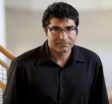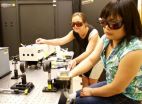(Press-News.org) CHAMPAIGN, Ill. — Buy the latest electronic gizmo du jour, or use that money to fix a leaky roof? Go out with friends, or stay home to catch-up on work to meet that looming deadline? And after you've finished that big project, do you treat yourself to a slice of chocolate cake or settle for a piece of fruit?
These are the kind of self-control dilemmas that people face all the time. And according to research from a University of Illinois expert in new product development and marketing, self-focus plays an important role in how consumers make decisions.
When prompted to think abstractly, too much self-focus can lead to feelings of missing out on life, which then induces regret and leads to corrective overindulgence – a finding that runs counter to much of the extant consumer psychology literature, says published research from Ravi Mehta, a professor of business administration.
"The classic line of research said that people are impulsive – they don't think long-term, they engage in indulgent, decadent behavior, and sometimes lose self-control," Mehta said. "A few years later, there was another stream of research that showed if people thought abstractly, they would begin to think more about their long-term financial well-being and wouldn't engage in hedonistic behaviors."
But Mehta and his co-authors found it all depends upon "how much you think about yourself in consumption situations."
"The role of the self in this whole phenomenon plays a very key role," he said. "If I were to ask you to imagine yourself 10 years from now, and then tempt you with indulgent behavior, that essentially grants you a license to indulge."
In the scenario above, why would a person give in to, say, a decadent dessert?
"Because you picture yourself 10 years from now – you have no idea where you will be, or what your situation will be like," Mehta said. "You start thinking about yourself in terms of long-term happiness. So you say to yourself, 'I'll live a little!' and give in to temptation. And that's because you are focusing on your own self at the expense of the big picture."
While the majority of research routinely criticizes consumers for being too impulsive, Mehta contends that consumers exhibit self-control the vast majority of time.
"You only remember the times when you've given in to your impulses," he said. "Even though most people have self-control, it's just those few failures that you remember the most. And here we are saying, 'We control our everyday behavior, but we only indulge when we think long-term.' That's counterintuitive."
The study also asked a sample of consumers to compare their behavior in general to the average American consumer. The results indicate that 79 percent of people said they control their impulses most of the time. But 81 percent of respondents said U.S. consumers are impulsive people.
"So it's, 'I'm not impulsive and indulgent, but everyone else is,' which is interesting, because that was our starting point," Mehta said. "Generally, people are able to control themselves. But if they think of themselves 10 years in the future at a higher construal level, then they want to enjoy life and, consequently, engage in deliberatively indulgent behavior."
The research has implications for brands selling high-end products.
"To sell trendy or luxury goods, marketers and advertisers would be wise to focus on encouraging the consumer to self-focus on distant-future events," Mehta said.
The research is also relevant to public health or public policy campaigns.
"It's just the opposite – they would want to create copy that emphasizes near-future events," he said.
INFORMATION:
The paper, titled "When Does a Higher Construal Level Increase or Decrease Indulgence? Resolving the Myopia versus Hyperopia Puzzle," will be published in the August issue of the Journal of Consumer Research. Mehta's co-authors are Rui (Juliet) Zhu of the Cheung Kong Graduate School of Business, Beijing, and Joan Meyers-Levy of the University of Minnesota.
The research was supported by the Social Sciences and Humanities Research Council of Canada.
Editor's note: To contact Ravi Mehta, call 217-265-4081; email mehtar@illinois.edu.
The paper is available online.
'Big picture' thinking doesn't always lead people to indulge less, study says
2014-07-23
ELSE PRESS RELEASES FROM THIS DATE:
Urban heat boosts some pest populations 200-fold, killing red maples
2014-07-23
New research from North Carolina State University shows that urban "heat islands" are slowly killing red maples in the southeastern United States. One factor is that researchers have found warmer temperatures increase the number of young produced by the gloomy scale insect – a significant tree pest – by 300 percent, which in turn leads to 200 times more adult gloomy scales on urban trees.
"We'd been seeing higher numbers of plant-eating insects like the gloomy scale in cities, and now we know why," says Adam Dale, a Ph.D. student at NC State and lead author of two papers ...
NASA sees Typhoon Matmo making second landfall in China
2014-07-23
NASA's Terra satellite passed over Typhoon Matmo when it was moving through the Taiwan Strait for its final landfall in mainland China.
On July 23 at 02:45 UTC (July 22 at 10:45 p.m. EDT), the Moderate Resolution Imaging Spectroradiometer or MODIS instrument aboard NASA's Terra satellite captured a picture of Typhoon Matmo after its center crossed the northern part of the island nation of Taiwan and entered the Taiwan Strait. The Taiwan Strait is the body of water between western Taiwan and southeastern China. The MODIS image showed a cloud-covered center of circulation, ...
Targeting the brain to treat obesity
2014-07-23
Unlocking the secrets to better treating the pernicious disorders of obesity and dementia reside in the brain, according to a paper from American University's Center for Behavioral Neuroscience. In the paper, researchers make the case for treating obesity with therapies aimed at areas of the brain responsible for memory and learning. Furthermore, treatments that focus on the hippocampus could play a role in reducing certain dementias.
"In the struggle to treat these diseases, therapies and preventive measures often fall short. This is a new way for providers who treat ...
UNC researchers find unsuspected characteristics of new CF drugs, offering potential paths to more effective therapies
2014-07-23
In lab experiments using tissue samples cultured from cystic fibrosis patients, scientists at the UNC School of Medicine and the UNC Marsico Lung Institute have shown that a new CF drug counteracts the intended beneficial molecular effect of another CF drug.
The finding, published today in the journal Science Translational Medicine, shows how a mutant CFTR protein becomes unstable and loses its ability to function properly when in the presence of the two drugs. The research offers several insights into how novel CF pharmacotherapies could be improved.
“In our human ...
Spinach could lead to alternative energy more powerful than Popeye
2014-07-23
WEST LAFAYETTE, Ind. — Spinach gave Popeye super strength, but it also holds the promise of a different power for a group of scientists: the ability to convert sunlight into a clean, efficient alternative fuel.
Purdue University physicists are part of an international group using spinach to study the proteins involved in photosynthesis, the process by which plants convert the sun's energy into carbohydrates used to power cellular processes.
"The proteins we study are part of the most efficient system ever built, capable of converting the energy from the sun into chemical ...
The birth of topological spintronics
2014-07-23
The discovery of a new material combination that could lead to a more efficient approach to computer memory and logic will be described in the journal Nature on July 24, 2014. The research, led by Penn State University and Cornell University physicists, studies "spin torque" in devices that combine a standard magnetic material with a novel material known as a "topological insulator." The team's results show that such a scheme can be 10 times more efficient for controlling magnetic memory or logic than any other combination of materials measured to date.
"This is a really ...
Strategy proposed for preventing diseases of aging
2014-07-23
AUDIO:
Some researchers are proposing that changing how medical care is delivered could help prevent multiple chronic diseases and extend healthy lifespan. The idea, they argue, would be to target the...
Click here for more information.
Medicine focuses almost entirely on fighting chronic diseases in a piecemeal fashion as symptoms develop. Instead, more efforts should be directed to promoting interventions that have the potential to prevent multiple chronic diseases and extend ...
Sleep deprivation may increase susceptibility to false memories
2014-07-23
Not getting enough sleep may increase the likelihood of forming false memories, according to research published in Psychological Science, a journal of the Association for Psychological Science.
In a study conducted by psychological scientist Steven J. Frenda of the University of California, Irvine and colleagues, sleep-deprived people who viewed photographs of a crime being committed and then read false information about the photos were more likely to report remembering the false details in the photos than were those who got a full night's sleep.
Research has demonstrated ...
Satellite shows Atlantic Tropical Depression degenerate
2014-07-23
NOAA's GOES-East satellite captured imagery of the Atlantic Ocean's Tropical Depression 2 is it degenerated into a tropical wave on July 23.
At 1445 UTC (10:45 a.m. EDT), NOAA's GOES-East satellite captured an image of what was once Tropical Depression 2 (TD2), about 400 miles east of the Lesser Antilles. The GOES-East visible satellite imagery indicated that the depression weakened since July 22. TD2 appeared as just a weak swirl of clouds with no strong thunderstorms or deep convection. The GOES image was created by NASA/NOAA's GOES Project at NASA's Goddard Space Flight ...
Gene inhibitor, salmon fibrin restore function lost in spinal cord injury
2014-07-23
Irvine, Calif., July 23, 2014 — A therapy combining salmon fibrin injections into the spinal cord and injections of a gene inhibitor into the brain restored voluntary motor function impaired by spinal cord injury, scientists at UC Irvine's Reeve-Irvine Research Center have found.
In a study on rodents, Gail Lewandowski and Oswald Steward achieved this breakthrough by turning back the developmental clock in a molecular pathway critical to the formation of corticospinal tract nerve connections and providing a scaffold so that neuronal axons at the injury site could grow ...






